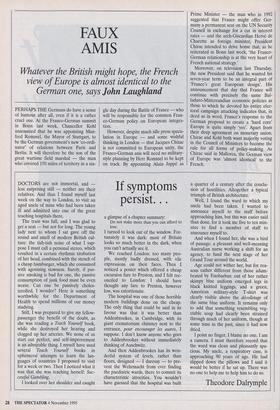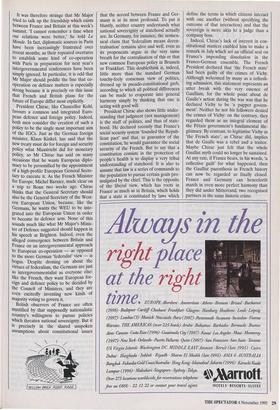FAUX AMIS
Whatever the British might hope, the French view of Europe is almost identical to the
German one, says John Laughland PERHAPS THE Germans do have a sense of humour after all, even if it is a rather cruel one. At the Franco-German summit in Bonn last week, Chancellor Kohl announced that he was appointing Man- fred Rommel, the Mayor of Stuttgart, to be the German government's new 'co-ordi- nator' of relations between Paris and Berlin. It will therefore be the son of the great wartime field marshal — the man who covered 150 miles of territory in a sin- gle day during the Battle of France — who will be responsible for the common Fran- co-German policy . on European integra- tion.
However, despite much idle press specu- lation in Europe — and some wishful thinking in London — that Jacques Chirac is not committed to European unity, the Franco-German axis will need no military- style planning by Herr Rommel to be kept on track. By appointing Alain Juppe as Prime Minister — the man who in 1992 suggested that France might offer Ger- many a permanent seat on the UN Security Council in exchange for a cut in interest rates — and the arch-Giscardian Herve de Charette as foreign minister, President Chirac intended to drive home that, as he reiterated in Bonn last week, 'the Franco- German relationship is at the very heart of French national strategy.'
Moreover, on television last Thursday, the new President said that he wanted his seven-year term to be an integral part of `France's great European design'. His announcement that day that France will continue with precisely the same Bal- laduro-Mitterrandian economic policies as those to which he devoted his entire elec- toral campaign attacking indicates that, in deed as in word, France's response to the German proposal to create a 'hard core' Europe is quite simply 'yes'. Apart from their deep agreement on monetary union, Chirac and Kohl both want majority voting in the Council of Ministers to become the rule for all forms of policy-making. As Chirac said in Mallorca, the German view of Europe was 'almost identical' to the French. tried was therefore strange that Mr Major tried to talk up the friendship which exists between France and Britain at this week's summit. 'I cannot remember a time when our relations were better,' he told Le Monde. In fact, diplomatic sources in Paris have been increasingly frustrated over recent months, as their repeated overtures to establish some kind of co-operation with Paris in preparation for next year's intergovernmental conferences have been simply ignored. In particular, it is odd that Mr Major should peddle the line that co- operation on defence matters is especially strong because it is precisely on this issue that French and British plans for the future of Europe differ most explicitly.
President Chirac, like Chancellor Kohl, favours a common and integrated Euro- pean defence and foreign policy. Indeed, both men consider the creation of such a policy to be the single most important aim of the IGCs. Just as the German foreign minister, Klaus Kinkel, has said that the new treaty must do for foreign and security policy what Maastricht did for monetary policy, so Mr Chirac has said on many occasions that he wants European diplo- macy to be personified by the appointment of a high-profile European General Secre- tary to execute it. As the French Minister for Europe, Michel Barrier, made clear on a trip to Bonn two weeks ago. Chirac thinks that the General Secretary should also be the General Secretary of the West- ern European Union, because, like the Germans, he wants the WEU to be inte- grated into the European Union in order to become its defence arm. None of this sounds much like what Mr Major's Minis- ter of Defence suggested should happen in his speech at Brighton. Indeed, even the alleged convergence between Britain and France on an intergovernmental approach to European co-operation — as opposed to the more German 'federalist' view — is bogus. Despite droning on about the virtues of federalism, the Germans are just as intergovernmentalist as everyone else: like the French, they want European for- eign and defence policy to be decided by the Council of Ministers, and they are even excitedly inventing new kinds of majority voting to govern it.
British observers of France are often Mystified by that supposedly nationalistic country's willingness to pursue policies which threaten national sovereignty. But it is precisely in the shared unspoken assumptions about constitutional issues that the accord between France and Ger- many is at its most profound. To put it bluntly, neither country understands what national sovereignty or statehood actually are. In Germany, for instance, the nonsen- sical claim that 'federalism means decen- tralisation' remains alive and well, even as its proponents argue in the very same breath for the centralisation of this or that new common European policy in Brussels or Frankfurt. This doublethink is, indeed, little more than the standard German touchy-feely consensus view of politics, dressed up in pseudo-constitutional garb, according to which all political differences can be made to evaporate into general harmony simply by thinking that one is acting with good will. President Chirac also shows little under- standing that judgment (not management) is the stuff of politics, and thus of state- hood. He declared recently that France's social security system 'founded the Repub- lican pact' and that, as guarantor of the constitution, he would guarantee the social security of the French. But to say that a constitution consists in the protection of people's health is to display a very tribal understanding of statehood. It is also to assume that law is a series of commands to the population to pursue certain goals pro- mulgated by the chief. This is the opposite of the liberal view, which has roots in France as much as in Britain, which holds that a state is constituted by laws which define the terms in which citizens interact with one another (without specifying the outcome of that interaction) and that the sovereign is more akin to a judge than a company boss.
Indeed, Chirac's lack of interest in con- stitutional matters enabled him to make a remark in July which set an official seal on France's impending dissolution in the Franco-German ensemble. The French President declared that 'the French state' had been guilty of the crimes of Vichy. Although welcomed by many as a refresh- ing admission, this statement represents an utter break with the very essence of Gaullism, for the whole point about de Gaulle's action during the war was that he declared Vichy to be 'a puppet govern- ment'. Neither he nor his followers denied the crimes of Vichy: on the contrary, they regarded them as an integral element of the Petain government's fundamental ille- gitimacy. By contrast, to legitimise Vichy as `the French state', as Chirac did, implies that de Gaulle was a rebel and a traitor. Maybe Chirac just felt that the whole Gaullist myth could no longer be sustained. At any rate, if France bears, in his words, 'a collective guilt' for what happened, then the Gaullist parenthesis in French history can now he regarded as finally closed. France and Germany can henceforth march in even more perfect harmony than they did under Mitterrand, two recognised partners in the same historic crime.











































































 Previous page
Previous page